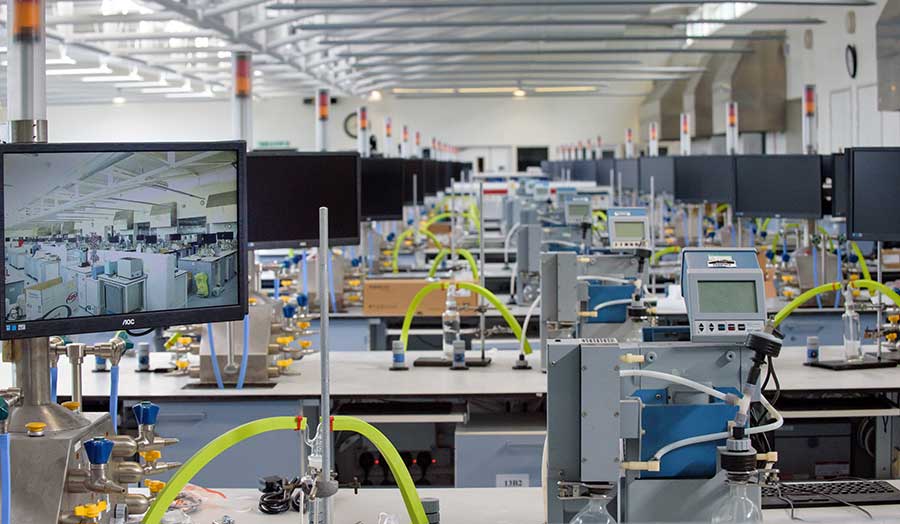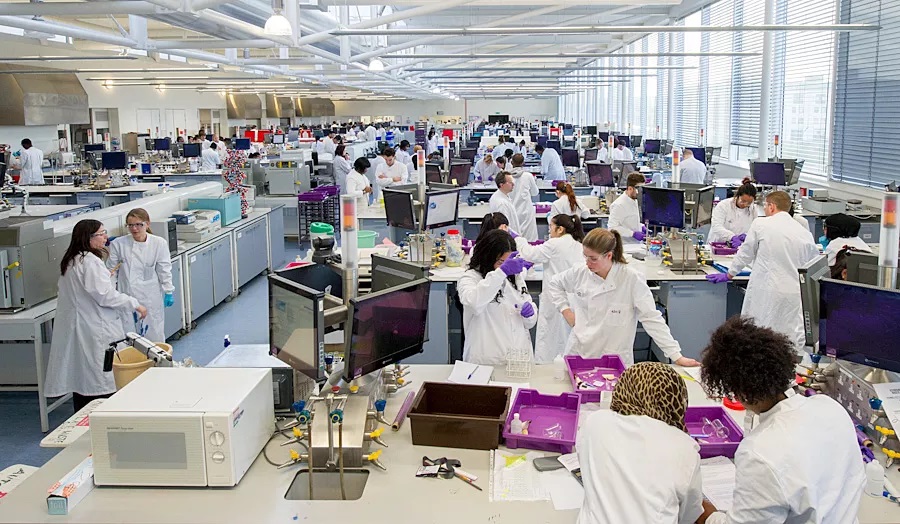Why study this course?
London Met’s Cancer Pharmacology master's course explores the nature of cancer at the systems, cellular and molecular levels, and focuses on the drugs which are used to treat different cancers and how they work. By the end of the MSc, you will have developed a deep understanding of how chemotherapeutic agents are used to target and kill cancer cells as part of a central strategy in the treatment of cancers.
More about this course
With worldwide cancer rates increasing and expected to reach 22 million new cases per year by 2030, this postgraduate course introduces you to how radiotherapy, surgery and chemotherapy have a vital role to play in prolonging the lives of patients.
We’ll provide you with an in-depth understanding of the molecular targets at which the different classes of anticancer drugs are aimed, and of how drug therapies are evolving. You’ll also review the biology of cancer with respect to genetics, pathological considerations and the molecular changes within cells which are associated with the progression of the disease.
You'll be taught by staff who are experienced researchers in areas such as cancer biology, immunology, genetics and bioinformatics. They will help you learn how to collect, analyse, interpret and understand scientific data you must make use of in the cancer pharmacology field. This ensures you’ll not only improve your intellectual knowledge but your practical skills as well.
Your laboratory-based project will be conducted in our £30 million Science Centre. This includes access to extensive cell culture facilities, electrophoresis equipment, polymerase chain reaction (PCR) cyclers and high performance liquid chromatography (HPLC) instrumentation.
Overall, this programme of advanced study provides you with the necessary skills, knowledge and understanding for you to pursue a career in anti-cancer drug development.
Assessment
Assessment on this master's course is completed through a combination of coursework, which includes tests and essays, the research project and its oral defence and examination.
Fees and key information
Apply nowEntry requirements
You will be required to have:
- at least a lower second class (2.2) UK first degree (or equivalent) in an appropriate subject, for example pharmacology, biomedical science, biological science or medical genetics (these will be considered on an individual basis)
- a minimum overall Academic IELTS score of 6.5, with at least 6.0 in each component
Accreditation of Prior Learning
Any university-level qualifications or relevant experience you gain prior to starting university could count towards your course at London Met. Find out more about applying for Accreditation of Prior Learning (APL).
English language requirements
To study a degree at London Met, you must be able to demonstrate proficiency in the English language. If you require a Student visa you may need to provide the results of a Secure English Language Test (SELT) such as Academic IELTS. This course requires you to meet our higher requirements.
If you need (or wish) to improve your English before starting your degree, the University offers a Pre-sessional Academic English course to help you build your confidence and reach the level of English you require.
Modular structure
The modules listed below are for the academic year 2023/24 and represent the course modules at this time. Modules and module details (including, but not limited to, location and time) are subject to change over time.
Year 1 modules include:
- This module currently runs:
- spring semester - Wednesday afternoon
This module provides an advanced understanding of the pharmacodynamics of therapeutic agents in the treatment of cancer.
The key aim of this module is to provide students with in-depth analysis of how the key classes of anti-cancer drugs mediate their effects, including a consideration of aspects of drug discovery, clinical trials, adverse effects, and possible future avenues of drug treatment.
- This module currently runs:
- autumn semester - Wednesday afternoon
This module provides an understanding of the clinical aspects of oncology, focusing on diagnosis and staging of different cancers, and the range of options open for therapy.
The aim of this module is to give a synopsis of the major cancers from the perspective of a diagnostician, thus providing a background to other modules on this course which focus on molecular and pharmacological aspects of the disease.
This module focuses on human diseases with a genetic component, from monogenic disorders to complex, multifactorial diseases. Consideration is also given to hereditary mechanisms not linked to DNA sequence (e.g. genomic imprinting).
The module aims to provide an appreciation of the genetic basis of inherited diseases and, wherever possible, relate disease phenotype to mutations in gene products or to aberrations in gene expression. The material covered emphasises how an understanding of human biology has advanced through the study of genetic diseases, explores the development of therapeutic strategies using up-to-date primary sources and discusses the latest technological innovations.- This module currently runs:
- autumn semester - Tuesday afternoon
This module provides an advanced understanding of cancer at the molecular level.
The key aim of this module is to inform students on sub-cellular aspects of cancer, focusing on molecular changes within cells which are associated with oncogenesis and the wide variety of different mechanisms within the cell which can be affected. Reference will be made to not only the understanding of key molecular mechanisms involved but also to identifying possible targets for diagnosis and therapy.
- This module currently runs:
- autumn semester
- summer studies
- spring semester
This module provides an opportunity for student-lead problem solving applying knowledge acquired to a specific research question . The module aims to provide students with the opportunity to apply and develop previously acquired knowledge and skills to a laboratory or IT-based biomedical research problem; and undertake, critically evaluate, reflect, and report on, an individual research programme.
- This module currently runs:
- autumn semester - Tuesday morning
- spring semester - Wednesday morning
The module is designed to provide students with an understanding of skills needed for the planning, organisation and practice of research in science. Different analytical approaches to problems will be reviewed together with the need to consider statistics and quality control in the design of projects. Students will consider the impact of appropriate safety, ethical and resourcing implications in the design and operation of a project.
- This module currently runs:
- autumn semester - Tuesday afternoon
This module is designed to provide students with (a) an in-depth understanding of current and (b) emerging formulation technologies for optimising dosage forms, (c) the mechanisms by which these therapeutic agents exert their mode of action (d) and the various routes of drug administration that can be exploited to maximise drug interactions. Also, it will aid students with an understanding of how to identify and critically evaluate the key factors and stages involved in designing formulations; enable students to appreciate the importance of the manufacturing process and the stability of drug formulation in the overall development of new products, and to enable students to examine selected ethical issues surrounding drug development and delivery.
- This module currently runs:
- autumn semester - Wednesday morning
The module uses online databases and software to extract, analyse and interpret DNA and protein sequences and to model structures of proteins.
This module aims to provide familiarity with the primary databases and common software packages used to analyse DNA, RNA and protein sequence, expression and structure, within and across genomes. It will also develop informatic skills for extracting, analysing and presenting data to extract biological knowledge and students will apply the principles of macromolecular, and in particular protein, structure to the building f molecular models using modelling and graphics software. The module will examine applications of modelling with emphasis on understanding the interactions between proteins and other molecules of biological or synthetic origin. - This module currently runs:
- autumn semester - Monday afternoon
The aim of this module is to provide an up-to-date understanding of chemical and biological technologies used in the drug discovery process.
This module aims to provide:
- students with knowledge and understanding of how chemical and biological technologies are used in drug discovery process
- an opportunity for extensive in-depth research and critical assessment of a topical issue
Where this course can take you
Our graduates primarily go on to pursue a career in anti-cancer drug development in academia or the pharmaceutical industry. The programme also provides an excellent basis for further research or study.
Additional costs
Please note, in addition to the tuition fee there may be additional costs for things like equipment, materials, printing, textbooks, trips or professional body fees.
Additionally, there may be other activities that are not formally part of your course and not required to complete your course, but which you may find helpful (for example, optional field trips). The costs of these are additional to your tuition fee and the fees set out above and will be notified when the activity is being arranged.
How to apply
Use the apply button to begin your application.
If you require a Student visa and wish to study a postgraduate course on a part-time basis, please read our how to apply information for international students to ensure you have all the details you need about the application process.
When to apply
You are advised to apply as early as possible as applications will only be considered if there are places available on the course.
To find out when teaching for this degree will begin, as well as welcome week and any induction activities, view our academic term dates.








